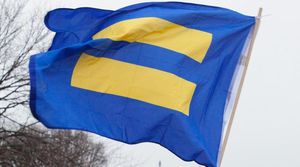With every episode of Strictly Come Dancing, there's bound to be excitement, drama, and occasionally controversy. This time, comedian Chris McCausland stirred the pot after his emotional performance during the November 9 live show, which featured illuminating dance moves intertwined with personal symbolism. McCausland, who is visually impaired, performed to John Lennon’s Instant Karma! (We All Shine On), showcasing not only his determination but also his unique experiences as the show’s first blind contestant.
McCausland’s routine culminated with what has been described as a "poignant blackout moment." He covered his dance partner Dianne Buswell’s eyes as the ballroom darkened, intending to evoke the disorientation he experiences due to his blindness. Once the lights returned, the audience gasped as McCausland was revealed to be spinning Buswell on his shoulders, surrounded by stunning pyrotechnics. This powerful moment received strong applause from the live audience and significantly impressed the judges, earning the couple 33 points.
Judges were moved by the emotional weight of the performance, with Craig Revel Horwood calling the blackout moment "absolutely spectacular," and Shirley Ballas, visibly touched, commending McCausland for consistently bringing his heart to the floor. "You have no fear; you come out every week with your heart on your sleeve, and you give us 100%," she said. Indeed, the performance not only captivated the audience but also garnered attention through social media discussions surrounding the nature of the competition.
Following the show, some viewers expressed frustration, claiming McCausland's continued presence was due more to public sympathy rather than his dancing skills. Comments on social media claimed he was winning the 'popular vote' rather than scoring higher on technical merit compared to his competitors. McCausland quickly rebuffed these assertions, stating on his own social media, "Interesting point but we've never had a lowered judges score than the person eliminated." This prompted discussions about the intersection between public sentiment and competitive dancing, particularly when it involves disabled participants who may face different expectations.
Chris, who also regularly discusses his views on perceptions of disability, commented on the circumstance of low expectations surrounding people with disabilities. He remarked, "There are quite low expectations of people with disabilities by quite a lot of people out there. To the point, sometimes you will come down some steps to a taxi outside, and they’ll say: ‘Ooh, wow, how did you do the steps on your own?'" McCausland aims to challenge these assumptions through his participation, shedding light on the capabilities of individuals with disabilities.
Despite his successful performance, it was evident from the reactions on social media and among fans of Strictly Come Dancing there was significant disagreement about the scoring process. Tweets flooded the platform from disgruntled viewers highlighting how others, deemed technically superior, had been sent home, raising questions about the fairness of the judging criteria. User @katbrown stated, "Chris and Dianne broke the cardinal rule of Couple's Choice tropes which is barefoot for emotion,” expressing frustration over the perceived inconsistency of what constitutes deserving scores.
Another user, @meganchloa, angrily expressed disbelief at the low score Chris received, saying, "I’m sorry but wtaf!? He is BLIND! Even if he could see, the dance deserved a LOT more than 7! I am speechless." Such sentiments echoed widely, indicating the audience's split opinion on the balance between emotional storytelling and technical dance skills.
Having lost his vision over time due to retinitis pigmentosa, McCausland continues to inspire viewers with his performances. His decision to join Strictly Come Dancing was not taken lightly; he had previously expressed reservations about participating due to the nature of being unable to see the dance. "There's no doubt we are surprising people, there's no doubt we are surprising ourselves," he stated on BBC Radio 4’s Today programme earlier this month.
Following the controversy, the comments from the judges may suggest they are aware of the potential for backlash. The focus placed on the emotional content of McCausland's performances appears to aim at creating more inclusive narratives within the competition. McCausland has emphasized, "I don’t want it to be seen as gimmicky. This is about putting the audience ‘in the dark.’"
The upcoming episodes are likely to be filled with tension and will serve as a test of McCausland's continued fighting spirit as he navigates both the dance floor and public opinion. Whether he can silence his critics and win over the judges remains to be seen, but one thing is sure—his performances will continue to challenge stereotypes and expand the conversation around disability.



